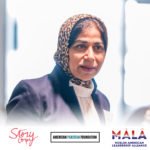*This story was produced in partnership with StoryCorps and American Pakistan Foundation (APF).
I always actually wanted to come to the United States, and I actually also wanted to come to New York to study there. It so happened that I got married to my husband who was studying in New York. So that was the logical next move was to move to New York. The year was 1992, and I took the flight with my husband from Lahore to JFK, New York. So I just graduated Medical school, so I was a doctor in Pakistan, I had dreams and wanted to practice. I realized that the journey (from Pakistan to America) took that dream a little bit further away for me. Since I landed here I realized that my degree was good, but it wasn’t enough for me to start practicing the next day. It was a little intimidating for me, a new relationship, a career that I thought I had under my belt. So those were the times where I had to self reflect a little bit, and I realized that I only had one way and it was by moving forward.
Growing up in Lahore, was phenomenal. I consider myself very privileged. I’m born in a family where the women were educated even in the early 1900s. The family was of the mindset where the adults and kids were in constant communication. So I grew up with cousins, and my aunts and uncles, and it was almost like you didn’t even need friends.
Now, that I’ve moved to Houston, strangely enough the first thing that comes from my mouth is that “I’m from New York”. But when they ask me, “Where are you from from?” To find out where I’m originally from, I do tell them, “I’m from Pakistan, I grew up in Dubai, and I was in New York for 17 years, and now I am in Houston”. So when I moved from New York, New York, to Cypress, Texas, which is a little suburb of Houston. It was a big change for me, it was a bigger change for me then what it was to move from Lahore to New York because it’s a different country. People are just different, people are very welcoming, very laid back, its a very faith-based community, and people are not afraid to bring faith in the conversation. And I’m an oncologist, and my job is to often take them through the journey of cancer, and I need to know people, in order for me to offer them their healing. Even though we can’t cure people, we can heal them. In order for me to get on the journey of healing, I need to know what heals that person, and I have noticed that faith is a very main denominator among the people here.
American Pakistan Foundation, for me, is a vehicle or a platform that connects the two worlds from Pakistan (where I was born and grew up) and America is where I chose to make my home. To me, there is an immense similarity, in the culture and tradition. To me, I also want to be engaged in organizations that are heavily focused on youth development and woman empowerment. American Pakistan Foundation provides both of those platforms. And the other thing that it does, which is phenomenal, is policy literacy. It is extremely important for people in America, that our strength is our challenge. Diversity is our strength and challenge because we can not take diversity and consider its inclusion, it’s not. In order for us to get included in the system, and be considered as a part of a policy, and decision making. We need to understand what that is. American Foundation also does a fantastic job of creating a platform for healthcare policy, and I think that is extremely important as well.
One of the things that I would like to challenge, I’ll take this position, is that it’s very insular. A lot of Pakistani people feel more comfortable staying within their own framework. So if you have an Eid party, for example, which is a big religious celebration. You would see that there is 150 people partying, and it would be only Pakistani people. So one of the things that I have set out to challenge, is to open up. Open up your homes, my home, our homes to a larger American community. Let people come in. We know each other as friends, coworkers, doctor patients, but we dont all know each other at a home level. Let us break bread together. On every occasion, invite people. I think by putting ourselves out there, and by showing up for other people, as a Pakistani American diaspora and community, we will make tremendous strides in building bridges. Never be afraid of being vulnerable and authentic, just be who you are.


